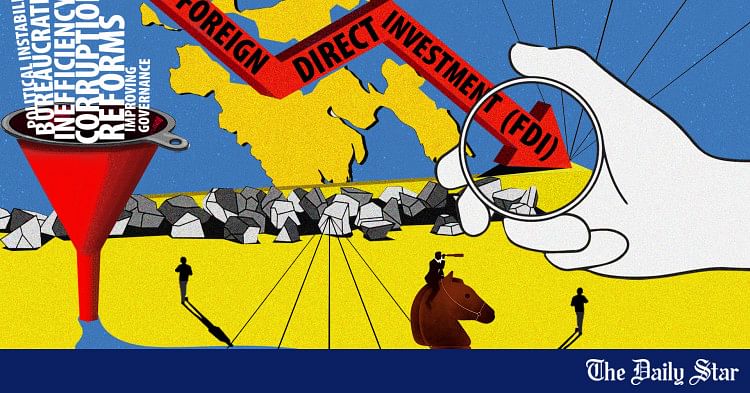Bangladesh has struggled to attract substantial foreign direct investment (FDI), as reflected in its low FDI as a percentage of GDP compared to regional peers. In 2023, Bangladesh’s FDI-to-GDP ratio was only 0.4 percent, while Vietnam’s was 4.3 percent. In that year, Vietnam attracted around $39 billion in FDI, whereas Bangladesh saw only around $3 billion. The July-September quarter of FY25 showed a 71 percent year-on-year decline in FDI for Bangladesh. It is well known that foreign investment drives economic growth by bringing capital, creating jobs, transferring technology, and enhancing global market access. For Bangladesh, with its large workforce, FDI is essential for industrialisation. Therefore, the decline in FDI threatens Bangladesh’s goal of becoming a middle-income country and requires immediate policy reforms.
Several factors contribute to the low inflow of FDI and the recent decline. Reversing the unsatisfactory FDI trend requires bold, forward-thinking policies and decisive action. Policymakers must take a holistic approach to creating a more attractive investment climate.
Firstly, bureaucratic red tape and corruption are significant deterrents to investment in Bangladesh. The country ranks poorly in global business environment indices and Transparency International’s Corruption Perceptions Index. Investors face excessive red tape, an unpredictable and unfriendly tax system, slow decision-making, and policy uncertainty. Lengthy procedures for obtaining permits, land, and utilities, combined with demands for bribes, frustrate both domestic and foreign businesses. The lack of transparency and accountability in governance further erodes investor trust. To address these issues, bureaucratic reforms are essential. Simplifying procedures, digitising services, and operationalising “one-stop service centres” (which are largely dysfunctional now) can reduce delays. Strengthening anti-corruption measures and ensuring accountability will help rebuild trust in the system.
Second, Bangladesh’s political landscape, marked by partisan conflict, the dominance of crony capitalists, and policy reversals, adds to investor uncertainty. Additionally, macroeconomic instability—high inflation, currency depreciation, and fiscal deficits—raises concerns about business viability. Investors seek stability, which Bangladesh struggles to guarantee. Establishing consistent policies, ensuring fair competition, and combating corruption are crucial. Strengthening institutions, enforcing contract laws, and maintaining political stability will foster a conducive environment for long-term investment.
Third, while the country has made some progress in infrastructure development, including mega-projects like the Padma Bridge and metro rail, significant gaps remain. Power shortages, inefficient ports, and congested transport networks raise business costs. In contrast, Vietnam’s integrated industrial zones offer a seamless experience. Bangladesh must prioritise infrastructure by accelerating key projects and improving maintenance. Public-private partnerships (PPPs) should be used to mobilise resources, but transparency is essential to avoid corruption and inefficiency.
Fourth, weaknesses in the country’s banking sector, including high non-performing loans (NPLs), financial mismanagement, and lack of oversight, dampen investor sentiment. Foreign investors are wary of a system with weak financial governance and regulatory oversight. Unstable exchange rates and low foreign exchange reserves further discourage investment. Stabilising the financial sector through stricter regulation and better governance is essential. Decisive actions to address NPLs, punish fraud, and restore confidence in the banking system are crucial for attracting foreign investment.
Fifth, Bangladesh boasts a young and growing workforce, but the quality of human capital remains a challenge. Many investors struggle to find adequately trained workers, particularly in technology-intensive sectors. Without substantial investment in education and vocational training, Bangladesh risks losing out on high-value FDI to competitors with better-equipped labour markets. Bangladesh must revamp its education system, align vocational training with industry needs, and promote STEM (Science, Technology, Engineering, and Mathematics) education to prepare workers for the evolving job market.
Finally, Bangladesh’s reliance on the ready-made garment (RMG) sector, which accounts for over 80 percent of exports, makes it vulnerable to external shocks and limits its appeal to diversified investors. While the RMG sector has been a success story, over-dependence on a single industry is risky, especially as global demand fluctuates and competition intensifies from other countries. To attract a broader range of investors, Bangladesh must diversify its economy. Policymakers must create an enabling environment for emerging industries by offering incentives, investing in skills development, and fostering innovation. Special economic zones (SEZs) with world-class facilities and streamlined regulations can serve as hubs for new industries and attract foreign investors.
The low level and decline in foreign investment are not just economic issues but reflections of deeper structural and governance challenges. For Bangladesh to achieve its ambitious development goals, it must confront these challenges head-on. Policymakers must recognise that attracting foreign investment is not just about offering tax breaks or incentives but about creating a stable, transparent, and business-friendly environment.
The time to act is now. The global economic landscape is rapidly evolving, and competition for investment is fiercer than ever. If Bangladesh fails to address the root causes of its waning FDI, it risks falling behind its peers.
Dr Selim Raihan is professor in the Department of Economics at the University of Dhaka and executive director of South Asian Network on Economic Modeling (SANEM). He can be reached at [email protected].
Views expressed in this article are the author’s own.
Follow The Daily Star Opinion on Facebook for the latest opinions, commentaries and analyses by experts and professionals. To contribute your article or letter to The Daily Star Opinion, see our guidelines for submission.


